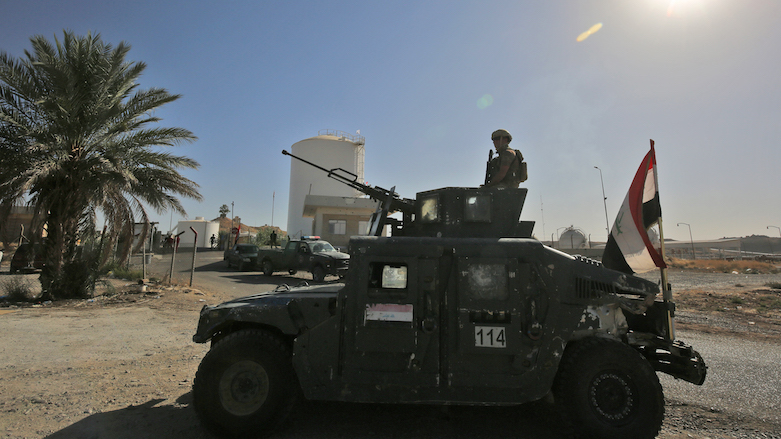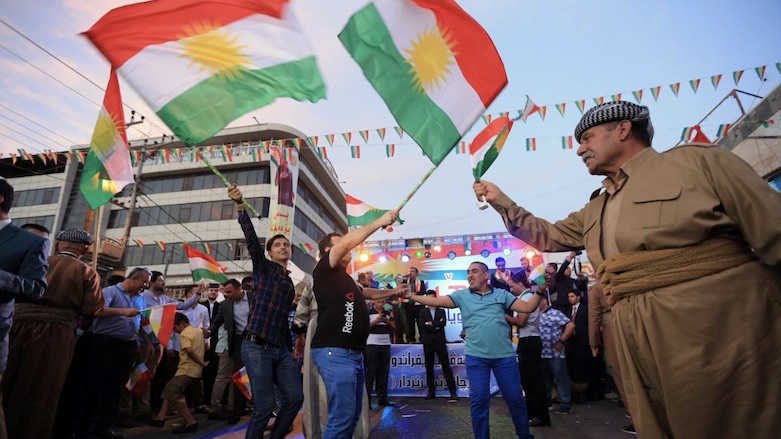US ‘neutrality’ over Kirkuk conflict sides with Iran, Shia forces

LONDON, United Kingdom (Kurdistan 24) – Days after US President Donald Trump’s bold speech on curtailing Iran’s destabilizing role in the Middle East, Iranian-backed Shia Hash al-Shaabi forces, under the auspices of Iranian commander of the Islamic Revolutionary Guard Corps (IRGC) Quds force Qassem Soleimani, took control of Kirkuk and other disputed territories.
As he decertified the Iran nuclear deal last week, Trump scolded Iranian attempts to sow “conflict, terror, and turmoil” across the Middle East.
Trump labeled the IRGC as “the Iranian Supreme Leader’s corrupt personal terror force and militia.”
Iran’s hand in Kirkuk bolsters Tehran’s regional interests and control over an array of forces that stretch from Iraq, Syria, and Lebanon.
The Kirkuk offensive not only tried to subordinate Kurds by creating divisions in Kurdistan’s political landscape, but it was also a clear answer to Trump’s recent threats on Iran.
Washington tried to downplay the mass mobilization of Shia forces in Kurdish-dominated areas and also Tehran’s role in the affair.
Operation Inherent Resolve spokesperson Col. Ryan Dillon refuted claims of elements of the Hashd al-Shaabi, also known as Popular Mobilization Forces (PMF), or Iranian forces in Kirkuk and the surrounding areas.
However, there were several reports and photographs of prominent Shia militia leaders such as Abu Mahdi al-Muhandis and Hadi al-Amiri, as well as Soleimani, in the Kirkuk area.
More importantly, even as Trump reiterated the US was “not taking sides” in the conflict between two allies, they had done just that.
Neutrality or the refusal to take sides always favors the perpetrator. By refusing to speak up against the PMF offensive, the US was essentially condoning it.
PMF units were largely armed and trained by Washington, and the main benefactor bolstering these forces was Iran, which made matters worse. The US supplied weaponry in the offensive was on full display as they drove out Kurdish forces.
Col. Robert Manning, a Pentagon spokesperson, played down the takeover as “coordinated movements, not attacks.” Meanwhile, the US embassy in Baghdad was clear in its support for Iraq to reassert federal authority “consistent with the Iraqi constitution” in all disputed areas.
US State Department Spokesperson Heather Nauert stated Washington was “very concerned by reports of violence around Kirkuk.” Nauert emphasized US support for “peaceful exercise of joint administration by the central and regional governments, consistent with the Iraqi constitution, in all disputed areas.”
While Nauert reiterated the US’ desire to encourage dialogue between Kurdistan and Iraq, calls for negotiations have largely fallen on deaf ears in Baghdad.
Iraqi Prime Minister Haider al-Abadi may be viewed as a strong man calling the shots, but Iran certainly influences Baghdad’s decision making.
Washington’s indifferent stance to recent events has led to a backlash from some US congressman.
US Senator Chris Van Hollen was the latest political figure to express strong concerns about the destabilizing effect of the incursion of Iraqi forces and Iranian-backed militias in Kirkuk and other disputed territories.
Van Hollen stated he was “deeply disturbed” by the Shia-led military assaults and urged Abadi to “cease hostilities against Kurdish Peshmerga forces” immediately.
Van Hollen’s criticism followed similar concerns from Senators John McCain, James Inhofe, Chuck Schumer, and Rep. Trent Franks.
McCain, head of the Senate Armed Services Committee, warned, “The United States provided equipment and training to the government of Iraq to fight [the Islamic State (IS)] and secure itself from external threats—not to attack elements of one of its own regional governments.”
McCain expressed concerns about reports that Iranian and Iranian-backed forces took part in the assault while warning of “severe consequences” if weapons supplied by the US were misused.
It is unlikely that Baghdad would have conducted the operations without the knowledge of the US. Days before the offensive, special envoy for the anti-IS coalition Brett McGurk was in Baghdad for talks with Abadi.
Mike Pompeo, Director of the Central Intelligence Agency (CIA), stated at a recent FDD National Security Summit that he is aware of reports that Soleimani was in Kirkuk.
The CIA director was critical of Iran’s growing role in several problems in the Middle East. “You can see the impact that they are having today in northern Iraq. The threat that they pose to US forces. We had an incident last week,” Pompeo added.
At the same security summit, General H.R. McMaster, the 26th Assistant to the President for National Security Affairs, stated, “Iran is very good at pitting communities against each other.”
McMaster hit out at Iran’s “hegemonic design” and use of “illegal armed groups in Iraq at the expense of regional security and stability.”
The growing US indifference over the Iraqi-Kurdish standoff has emboldened Baghdad and the militias to take decisive action.
As several Kurdish houses and shops were torched in Tuz Khurmatu, Khaniqin, and Kirkuk by the Shia militias, continued US neutrality has no rational basis and will undermine their most pro-western and dependable ally in the region.
Editing by Karzan Sulaivany

